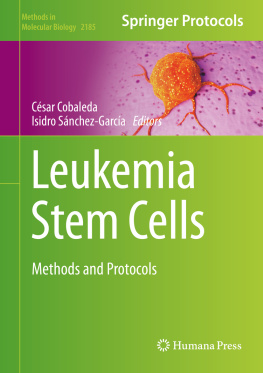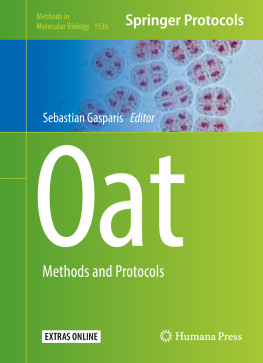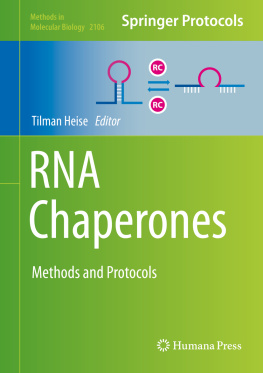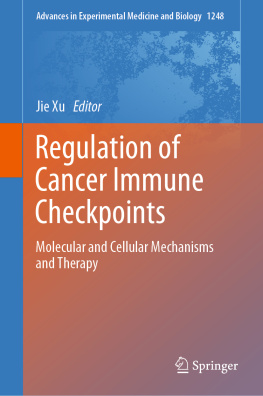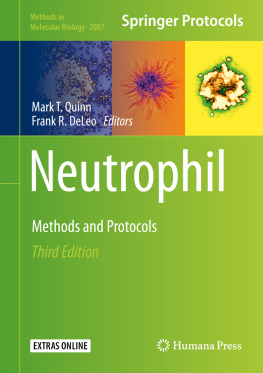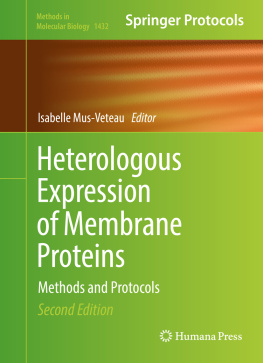Ivana Vancurova - Immune Mediators in Cancer: Methods and Protocols
Here you can read online Ivana Vancurova - Immune Mediators in Cancer: Methods and Protocols full text of the book (entire story) in english for free. Download pdf and epub, get meaning, cover and reviews about this ebook. year: 2020, publisher: Springer US, genre: Home and family. Description of the work, (preface) as well as reviews are available. Best literature library LitArk.com created for fans of good reading and offers a wide selection of genres:
Romance novel
Science fiction
Adventure
Detective
Science
History
Home and family
Prose
Art
Politics
Computer
Non-fiction
Religion
Business
Children
Humor
Choose a favorite category and find really read worthwhile books. Enjoy immersion in the world of imagination, feel the emotions of the characters or learn something new for yourself, make an fascinating discovery.
- Book:Immune Mediators in Cancer: Methods and Protocols
- Author:
- Publisher:Springer US
- Genre:
- Year:2020
- Rating:5 / 5
- Favourites:Add to favourites
- Your mark:
- 100
- 1
- 2
- 3
- 4
- 5
Immune Mediators in Cancer: Methods and Protocols: summary, description and annotation
We offer to read an annotation, description, summary or preface (depends on what the author of the book "Immune Mediators in Cancer: Methods and Protocols" wrote himself). If you haven't found the necessary information about the book — write in the comments, we will try to find it.
Immune Mediators in Cancer: Methods and Protocols — read online for free the complete book (whole text) full work
Below is the text of the book, divided by pages. System saving the place of the last page read, allows you to conveniently read the book "Immune Mediators in Cancer: Methods and Protocols" online for free, without having to search again every time where you left off. Put a bookmark, and you can go to the page where you finished reading at any time.
Font size:
Interval:
Bookmark:

For further volumes: http://www.springer.com/series/7651
For over 35 years, biological scientists have come to rely on the research protocols and methodologies in the critically acclaimedMethods in Molecular Biologyseries. The series was the first to introduce the step-by-step protocols approach that has become the standard in all biomedical protocol publishing. Each protocol is provided in readily-reproducible step-by-step fashion, opening with an introductory overview, a list of the materials and reagents needed to complete the experiment, and followed by a detailed procedure that is supported with a helpful notes section offering tips and tricks of the trade as well as troubleshooting advice. These hallmark features were introduced by series editor Dr. John Walker and constitute the key ingredient in each and every volume of theMethods in Molecular Biologyseries. Tested and trusted, comprehensive and reliable, all protocols from the series are indexed in PubMed.

Cover Illustration: Ovarian cancer cells grown in a 3D culture.
This Humana imprint is published by the registered company Springer Science+Business Media, LLC, part of Springer Nature.
The registered company address is: 233 Spring Street, New York, NY 10013, U.S.A.
It is the expression of various immune mediators in tumor cells that dictates the crosstalk between tumor cells and immune cells and determines cancer cell survival, proliferation, invasion, and tumor progression. These immune mediators include a variety of cytokines and chemokines, their receptors, as well as the recently identified immune checkpoints and their ligands. Knowledge of the quantitative and qualitative nature of these immune mediators is critical for early cancer diagnosis, but also for our understanding of the mechanisms regulating cancer progression. However, analysis of these immune mediators in tumor cells and tissues faces many challenges that include the low abundance, the need to distinguish between active and latent forms, and the need to measure multiple mediators in a single assay. This volume provides a comprehensive collection of classic and cutting-edge methodologies, as well as bioinformatics and genome editing approaches that are used to quantify immune mediators and analyze their function and biological activity in cancer cells and tissues.
The chapters are divided into four main parts. The first part focuses on the detection of immune mediators in cancer cells and tissues, biopsies, and blood samples, using assays that measure the total levels of mediators regardless of their biological activities. These assays include immunoblotting, ELISA, flow cytometry, and immunohistochemistry. In addition, the complexity of immune responses has led to the development of multiplex technologies that allow for the simultaneous detection of large numbers of proteins in small volumes. Thus, the first part also includes the Luminex multiplex assays that allow the simultaneous measurement of multiple mediators in small sample volumes with time- and cost-saving advantages.
However, since the aforementioned assays cannot distinguish between biologically active and inactive molecules, bioassays are used to measure the different biological activities of various cytokines, chemokines, and immune checkpoints. These bioassays include analysis of cytokine-induced cancer cell invasion, migration, ability to grow and proliferate in 3D culture spheroids, autophagy, ferroptosis, and isotype switching. Moreover, the second part includes approaches used for blocking the cytokine biological activity by using DNA aptamers, as well as methods used for probing cytokine-induced metabolic changes in cancer cells.
Often, there is a need to analyze the intracellular levels of various immune mediators or the mechanisms regulating their expression and signaling in cancer cells and tumor microenvironment. The third part includes protocols for the analysis of cytokines and immune checkpoints by immunoblotting and flow cytometry, as well as protocols for quantitative analysis of their promoter occupancy by using chromatin immunoprecipitation, and for the analysis of gene polymorphisms and alternative splicing. In addition, the third part includes chapters focusing on the use of microscopic and optogenetic approaches to analyze interactions of cancer cells with tumor microenvironment and to manipulate signaling pathways.
Recent advances in DNA and RNA sequencing and proteomic technology have led to the generation of a large number of datasets. Bioinformatical analyses of those datasets can provide valuable information for studying the function and biological activities of immune mediators in cancer cells and tissues. The fourth part includes some of the bioinformatical tools used for phylogenetic analyses and identification of long non-coding RNAs to expand our knowledge of immune mediators genes and their regulation. This part also includes protocols for gene knock-out and knock-in in cell-based models through genome editing.
There is no best method, since each has its own merits and limitations. Choosing the right method depends on the sample, purpose of the assay, and the available instrumentation. Often, using combined information from several different approaches can yield the most accurate knowledge of the quantitative and qualitative nature of immune mediators expression and regulation. The reliability of the protocols has been tested in laboratories around the world. Each chapter is appended by notes that navigate through the protocol and serve as a troubleshooting guide. We hope that this book will be useful to not only biochemists, molecular biologists, cancer biologists, and immunologists but also physician-scientists working in the field of immunology and cancer research.
Font size:
Interval:
Bookmark:
Similar books «Immune Mediators in Cancer: Methods and Protocols»
Look at similar books to Immune Mediators in Cancer: Methods and Protocols. We have selected literature similar in name and meaning in the hope of providing readers with more options to find new, interesting, not yet read works.
Discussion, reviews of the book Immune Mediators in Cancer: Methods and Protocols and just readers' own opinions. Leave your comments, write what you think about the work, its meaning or the main characters. Specify what exactly you liked and what you didn't like, and why you think so.




